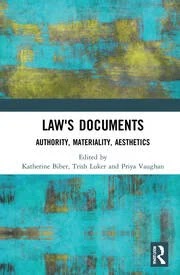Sara Dehm, University of Technology Sydney, Faculty of Law, has posted Passport Struggles: Lawful Documents and the Politics of Recognition and Refusal, which appears in Law’s Documents: Authority, Materiality, Aesthetics, ed. Katherine Biber, Trish Luker and Priya Vaughan (Routledge, 2022), 71-93:
The passport is a jurisdictional document. This means that the passport is not only a document that has a particular legal status or that is instrumental to and created by legal regimes of state surveillance and migration control. Rather, as a jurisdictional document, the passport gives shape to legal relations, lawful subjects and practices of authority and recognition. This chapter traces two legal struggles over the changing forms and authority of passports: what I shall refer to as ‘passport struggles’. The first passport struggle concerns recent campaigns to “degender” – or gender otherwise – the contemporary state-issued passport. Here, I focus on two current or recent legal cases in the United Kingdom and the United States that turn on legal concepts of veracity and privacy in order to limit or transform the power of the state to exclusively prescribe gender in binary (female/male) terms within contemporary passport systems. The second passport struggle, in contrast, centres on the use and recognition of passports issued by First Nations political authorities, using the case of the Haudenosaunee passport as an illustrative example.
This chapter thus seeks to trace and interrogate the legal histories and contemporary reception of the modern passport as a legal document. There is a rich body of migration studies scholarship showing how state documents such as the passport are used to solidify and police the stark legal distinction between people deemed to be citizens or non-citizens. This includes analysing how migrants ‘on the ground experience, accept and reject state bureaucratic practices in a time of increasing securitization’ (Horton, 2020, 6). The two passport struggles that I explore in this chapter, however, play out either at the margins of state citizenship such that they seek to expand ideas and practices of inclusive citizenship and identity inscription, or reject state-bestowed citizenship outright in favour of other modes of identification, nationhood and political belonging. For this reason, state regimes of documentation and their embedded politics of recognition also need to be read alongside situated and embodied politics of refusal articulated within collective struggles for different legal arrangements or legal categories.
--Dan Ernst
